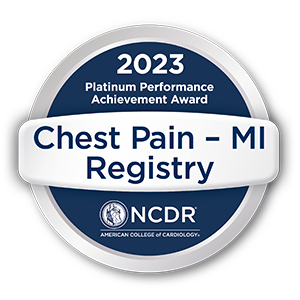Francine's not so normal evening at home
“As I was getting ready to go to bed, I felt a strange sensation in my chest. My back and arms also hurt, but I attributed the pain to a recent move and trying to organize my new apartment.”
That’s what Francine described as a normal evening at home.
“The symptoms of coronary disease can be quite varied. For many patients, the thought of a heart attack is the last thing their mind goes to. For instance, we’ve seen people come in that thought they had a toothache, gallbladder issues, or back and shoulder pain that turned out to be related to the heart,” said John Watson, MD, cardiothoracic surgeon.
In Francine’s case, she drove herself to the hospital and made light of the situation. “When I arrived, I casually walked in and in a joking manner told the receptionist I thought I was having a heart attack,” Francine recalled. While two electrocardiogram’s or EKG’s, showed normal results, her labs revealed elevated blood, or cardiac enzymes indicative of a heart attack. “I promptly asked about St. Louis because it was common for people to go there,” explained Francine.

“My doctor told me it was my choice, but he recommended Carbondale because it was the closest facility that offered cardiac surgery and he had worked with a physician from Carbondale and felt comfortable with them.”
Upon arrival at SIH Memorial Hospital Carbondale, Francine was admitted to the catheterization lab to determine what course of action needed to be taken. With Francine’s particular situation, cardiologists with SIH Prairie Heart Institute quickly discovered multiple blockages and consulted with Dr. Watson for bypass surgery as the safest option. In Francine’s case, the SIH Prairie Heart Institute team had time to investigate the anatomy of her blockages to determine the safest and best approach.
“Francine was relatively healthy overall. She presented after a few days of symptoms and her heart function was good. Fortunately, she did not have any chronic illnesses that would put her at high risk for surgery such as diabetes or chronic obstructive pulmonary disease, or COPD, for example. She was a very active person", said Dr. Watson.
“Dr. Watson was very personable and one of the most down-to-earth people I could ask for,” said Francine. “All the staff were professional, courteous, kind and had a mannerly demeanor –all the physicians, physicians’ assistants, nurses, aides, lab techs, and even the maintenance and cafeteria technicians took time to be fun despite their frantic schedules."
Dr. Watson said Francine and patients seeking care at SIH Prairie Heart Institute benefit from close collaboration among cardiologists, surgeons, the catheterization lab team, intensive care unit and support across the organization.
“There are several different layers that go into diagnosing and caring for people with heart disease. For instance, diagnosis before catheterization through stress tests or nuclear tests. Our coordinate program also offers surgical valve replacements, trans-catheter valve replacements, or TAVRs, and procedures to treat atrial fibrillation, or A-Fib SIH Prairie Heart Institute is the only program in Southern Illinois offering open-heart surgery."
“I hope others don’t take their health for granted or the expertise available to those of us that live in Southern Illinois. I cannot say enough positive things about SIH Prairie Heart Institute, and hope that others take into consideration the talent, knowledge and efficiency available to those nearby,” Francine said.
According to the American Heart Association, here are the most common early warning signs of a heart attack:
- Chest discomfort: An uncomfortable pressure, squeezing, fullness or pain that may last for several minutes or comes and goes.
- Discomfort in other areas of the upper body: Pain or discomfort could be in both arms, the back, new, jaw or stomach.
- Shortness of breath: This could happen with or without chest discomfort.
- Other signs: These could be a breaking out into a cold sweat, nausea, lightheadedness, back pain or jaw pain.
Visit SIH_Prairie Heart Institute – to learn more about the services available and ways to stay heart healthy.